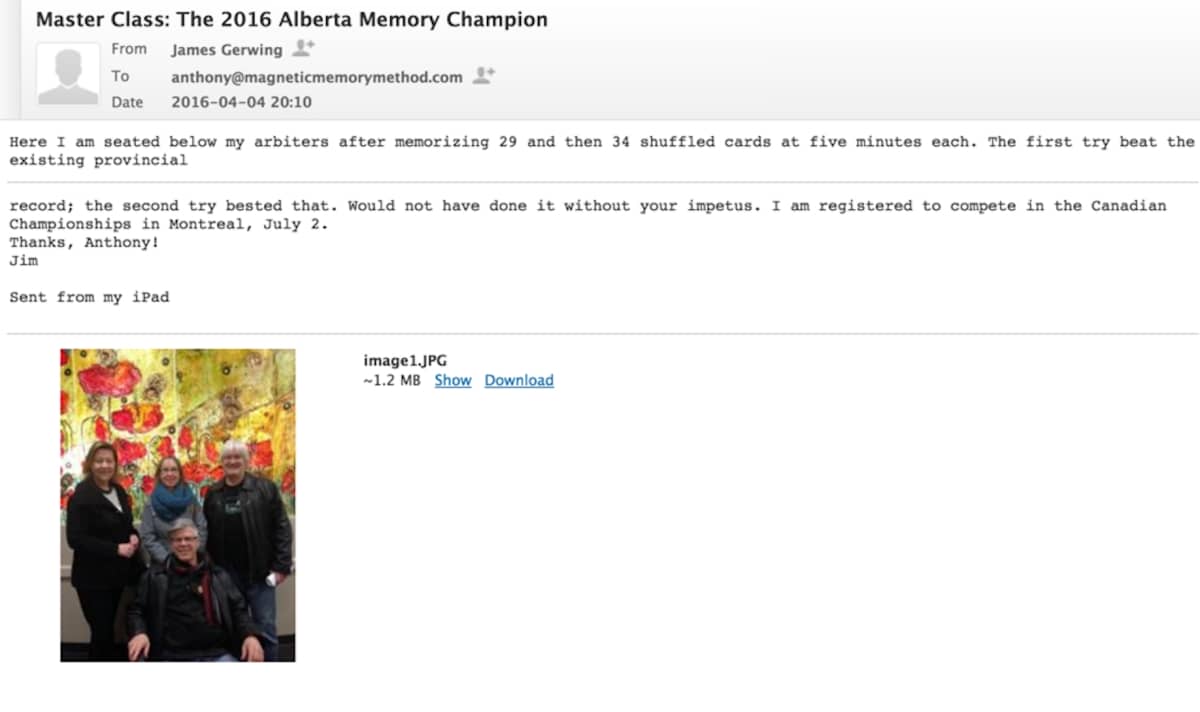Podcast: Download
Subscribe: Apple Podcasts | RSS

Oh sure, the scientists talk about short term memory and long term memory.
Retrieval failure and ineffective coding.
Motivated forgetting and memory loss due to brain trauma, not unlike the kind we learned about in this episode of the Magnetic Memory Method Podcast (and how to bounce back from it):
All important stuff.
But let me ask you this:
What About The Real Causes Of Forgetting?
To find out, you’ve got to be a bit of detective.
I’m going to suggest three of the biggest causes, but at the end of the day, you also need to seek out the causes in your own life.
Like a detective.
But the following three are widely unknown, and the best time to start ousting them from your life is now.
The first is simple:
It’s general mental and memory fitness.
But the majority of people?
They’re doing nothing about it.
And get this:
Not Exercising Your Memory Is A HUGE Mistake
Why?
Well, let me ask you something:
You know all those little slips all memory experts make from time to time?
They’re nothing.
N-o-t-h-i-n-g.
Certainly nothing like the Garden of Oblivion featured on this Wiki page about forgetting some people make it out to seem:
Definitely not a problem compared to the mountains a person with decent memory skills can move when push comes to shove.
But if you’re not keeping your mind fit with organic memory exercise – not “apps” – you’re cruisin’ for a bruisin’.
The solution?
Develop some organic memory fitness instead. To help, here are 5 Memory Improvement Exercises That Don’t Require Another Annoying App.
You can also explore developing the tools used with memory pegs. It’s a powerful memory exercise.
The Big Fat Memory Lie People Love To Tell
A lot of people out their aren’t telling the truth.
They’ll tell anyone who’ll listen about having a weak or bad memory.
Look:
It’s bad enough if you lie to yourself.
But lying to others?
That’s a big problem.
Why?
Because those to whom you lie might actually hold you accountable to the things you tell them about your memory.
Never Ever (Ever!) Insult Your Memory
Look, I know it seems innocent enough, but telling people you have a bad memory is far from in.
In fact, it’s a crime.
Why?
Because your thoughts matter and you should NEVER insult your memory.
How To Stop Lying About Your Memory
Instead of saying, “I can’t remember” and things like that, try something else.
When memory “fails,” try saying things like, “I’m sorry. I’m always exercising my memory. It’ll come back to me.”
I promise.
By doing this, you’ll create an entirely new and more powerful relationship with your memory.
This new relationship will make you very happy and bring you immense success. It may even help you experience some flashbulb memories thanks to the effects of radical honesty in your memory training efforts.
How To Chill Out And Remember More
Do you want to know why memory improvement seems like such a drag when others teach it?
Because they put so much pressure on making it happen.
No. Oh no. Please no.
We’re not in a competition here, not in the Magnetic Memory Method universe.
Sure, the Magnetic Memory Method can help you win competitions. I’m happy to announce that my memory training has contributed to such triumphs not once, but twice:
That’s a happy side effect, and one I’m proud of.
By my core focus falls on getting you to relax your memory so you can slide important info into long term memory.
Info you want to stay for awhile.
Not Bland, Boring And Mind-Butchering Info You’ll Never Use!
In some cases (like when you’re learning a language or skill), you want that info to stay forever.
The blunt, cold hard truth:
If you’re as rigid as a rock, it never will. Information will bounce off your brain faster than you can blink.
So here’s what I suggest:
Learn how to concentrate and improve memory Buddha-style.
Then leave a comment below and tell me what you think.
Are you making any of the 3 memory mistakes that cause so much forgetting?
And let me know:
What do you need to help you remove these mistakes?
If it’s a memory improvement video course, just click on the image below to get started:
But please promise me one thing:
Promise that you’ll stay away from memory supplement pills.
Trust me.
Not only does taking them put a burden on your memory (you have to remember to take them, after all).
But they don’t get at the root causes of why we forget and all the core factors that influence forgetting.
Look forward to hearing from you in the comments and talk soon. And for now, here are 12 more causes of forgetting you can avoid with some simple tactics:







Hi Anthony, I have a good memory for most things and I don’t insult it. When I can’t remember something, I’ll say it is on the tip of my tongue, it will come to me within the hour. I have studied many things at university and can remember many complex things.
However, when it comes to the words to a song or a rhythm no matter how many times I have heard it, I’ve been always at a loss to remember either, short term or long term.
I used to be very embarrassed by this but by my 67th year I now say that “I do not have the file to remember music, words or tunes.” And this relieves any embarrassment of feeling stupid or pressure in having to remember it. It has always been like this even when I was a child.
Do you know of others like myself? Is there a scientific reason for this or is it based on trauma?
Great post, Esther, and thanks for stopping by.
I suppose trauma could be involved for some people, but having gone through a lot myself, it can’t be a cause in my case. It really just depends on how you want to run the diagnosis.
For that reason, if the trauma diagnosis is made scientifically, then there could be a scientific reason. For example, it is said that children of alcoholics tend to develop certain pain issues later in life, etc. Pain is a huge reason why people forget, namely because the pain takes their attention away from proper perception.
Pain or no pain, ultimately the reason why we forget things is that they’re not :
1. Effectively encoded
2. Effectively decoded through repetition
The Magnetic Memory Method helps people do both of these things in a way that normally overcomes any and all barriers. It works at any age so far, ranging from 8-80.
So if you did want to remember things like lyrics, then that is something memory techniques can help you with.
You can also use them for remembering rhythm, which is actually something I’ve been thinking a lot about and have had demands to cover from when I played in a band and had to learn things quickly. It involves creating a binary code that is essentially already in music and memorizing that.
There is an option for everything when it comes to memory techniques, so thanks again for supporting this educational effort by sharing your experience. I look forward to your next contribution! 🙂
Nice post. I find it interesting that yesterday I saw on YouTube a video about Tesla’s way of thinking and imagery. And here I am now gazing at his image on your book 😀
It must be serendipity through the electricity. I’m glad the connection was made! 🙂